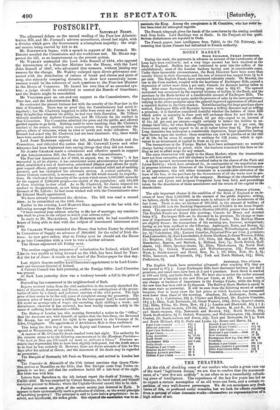POSTSCRIPT.
SATURDAY NIGHT.
The adjourned debate on the second reading of the Poor-law Adminis- tration Bill, and Mr. Ferrand's adverse amendment, closed last night, with a division which gave the Government a triumphant majority; the origi- nal motion being carried by 218 to 42. Mr. BORTHWICK began, with a speech in support of Mr. Ferrand. Mr. Escorr assailed the Commission and the workhouse test. Mr. MILES sup- ported the bill, as an improvement on the present system.
Mr. WAKLET contrasted the Lord John Russell of 1834, who opposed the introduction of a Poor-law Minister into the House, with the Lord John Russell of 1847, who advocated that measure, without *stating any reasons for the change. Mr. Wakley enlarged upon divers grievances con- nected with the distribution of rations of bread and cheese and pints of soup, also minutely comparing dietaries, to show how excessively incon- venient would be the reference of such questions to the Poor-law Minister in the House of Commons. He hinted his own idea of an amended sys- tem: a judge should be established to control the Boards of Guardians; and the Boards might be remodelled.
Mr. VILLIERS gave an out-and-out support to the Commissioners, the Poor-law, and the Administration Bill.
He contrasted the present humane law with the severity of the Poor-law in the time of Elizabeth. There was no proof that the Commissioners had acted ir- regularly; but Mr. Chadwick happened to differ from every one of them: in fact, they thought that whatever his ability, he had very little discretion. Mr. Villiers violently assailed the Andover Committee, and Mr. Christie for his conduct in that Committee. The Committee admitted the press and the public, and allowed garbled reports to go forth. Nothing could be more insulting than Mr. Christie's conduct to his seniors, nothing more unscrupulous than his questions into the private affairs of witnesses, whom he tried to terrify and make ridiculous. Mr. Disraeli had asked why Mr. Chadwick had not been dismissed: why, there would have been another Andover inquiry.
Lord JOHN MANNERS opposed the bill, defended Mr. Christie and the Committee, and ridiculed the notion that Mr. Cornwall Lewis and other witnesses had been frightened into saying things that they did not mean.
Sir JAMES GRAHAM made a substantial and effective speech in support of thd Administration Bill, the Poor-law, and the Commissioners.
The Poor-law Amendment Act of 1834, he argued, was no " failure"; it has succeeded in all its objects: it has substituted union administration for parochial relief, established a test of destitution, substituted diligent paid officersfor negli- gent unpaid officers, greatly improved the system of medical relief and of auditing accounts, and has extirpated the allowance system. A central authority, Sir James Graham contended, is necessary; and the bill would remedy its imperfec - tines. He vindicated the Lumanity of the system which raises 5,000,0001. annually for the support of 2,000,000 people—one eighth of the population; only 185,000 of those receiving in-door relief. As to Mr. Chadwick, Sir James imputed his conduct to disappointment, as not being selected to fill the vacancy on the re- tiretnent of Mr. Lefevre: he had never worked well with the Commissioners since Sir Edmund Head's appointment.
We have already mentioned the division. The bill was read a second time, to be committed on the 10th June.
Earlier in the evening, Lord MARCUS HILL appeared at the bar with the following message from the Crown— "I have received your address relating to the law of marriage; my considera- tion shall be given to the subject to which your address refers.' In reply to Mr. MACRINP.TON, Lord MORPETH said, he had considerable hopes of being able to deal with the subject of intermural interment next
Sir CHARLES WOOD reminded the House, that before Easter he obtained 'in Committee of Supply an advance of 300,0001. for the relief of Irish dis- tress: he now gave notice, that on Friday next he should ask the House to go into Committee with a view to vote a further advance.
The House adjourned till Friday next.
The motion suggesting measures of colonization for Ireland, which Lord Lincoln was unable to bring forward on the 13th, has been fixed for Tues- day the at of June: it stands at the head of the Notice-paper for that day.


























 Previous page
Previous page